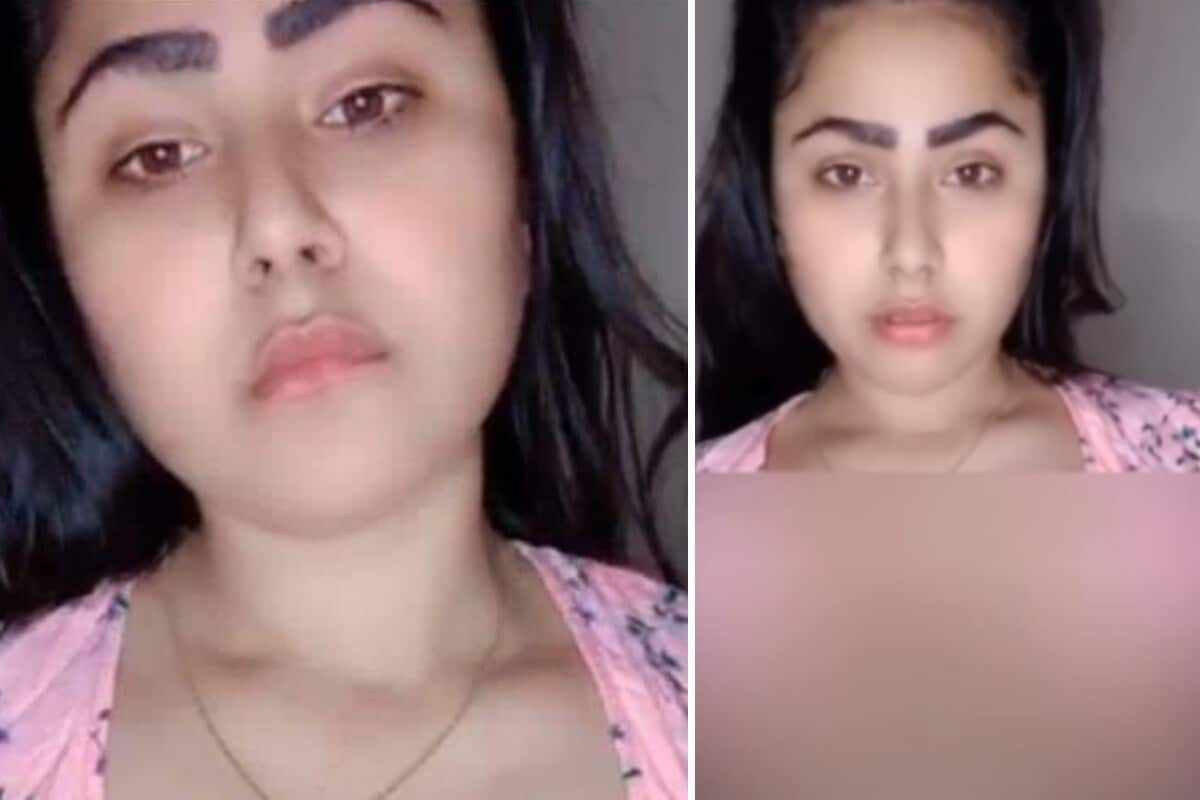Viral MMS Scandals: Trending Memes, Videos & Reactions
Is the relentless pursuit of virality on social media eroding the boundaries of privacy and consent? The recent surge in leaked "MMS" videos, featuring influencers and celebrities, suggests a disturbing trend where personal lives are becoming public spectacles, often fueled by malicious intent and the relentless hunger for clicks.
The digital landscape is increasingly littered with accusations and denials, as individuals find themselves entangled in controversies born from the ease with which private content can be disseminated. The concept of "going viral" has taken on a new, often sinister meaning, where a moment of vulnerability, a private interaction, or even a fabricated video can irrevocably alter a person's life and career. Sona Dey, a social media influencer, vehemently denied involvement in an alleged MMS video, characterizing it as a deliberate act of defamation. Her response, a common refrain in these situations, highlights the precarious position these individuals find themselves in, forced to defend their reputations against potentially damaging accusations. The pervasiveness of such incidents raises critical questions about accountability, the responsibility of social media platforms, and the ethical obligations of those who consume and share such content.
The year 2024 witnessed a significant uptick in "MMS" scandals that dominated headlines, involving well-known personalities like Oviya Helen, Minahil Malik, and Pragya Nagra. These incidents underscore the vulnerability of public figures to privacy breaches and the potential for personal content to be exploited for malicious purposes. These cases often involve the creation of fabricated videos, where the faces of celebrities are superimposed onto adult content. Anjali Arora's case provides a stark example, as she filed a defamation suit concerning a morphed video that circulated during her time on the reality show "Lock Upp." The legal battle further illuminates the legal and emotional toll these events take on those involved. The spread of these videos has consequences that extend beyond the immediate damage to reputation, including potential loss of work opportunities and significant mental trauma. Furthermore, it highlights the complexities of online reputation management in the face of increasingly sophisticated digital manipulation.
The social media ecosystem also offers a platform for such content, leading to a cascade of reactions, from genuine concern to morbid curiosity. The lack of adequate safeguards and content moderation policies contributes to the proliferation of non-consensual and manipulated material. This can lead to severe emotional distress and mental health issues for the individuals involved. The ease with which such content can be created and spread on social media platforms also calls into question the current measures for verification and takedown requests. While the platforms are making efforts to address these issues, the scale and speed at which these incidents occur pose a constant challenge.
Anjali Arora, a prominent figure in the digital realm, faced significant scrutiny when an alleged MMS video surfaced online in August 2022, coinciding with her appearance on a reality show. The video's rapid spread triggered intense debate and speculation about its authenticity. Her case underscores the challenges faced by public figures in navigating the complexities of online reputation management. In response to the controversy, Arora publicly denied involvement, stating that she was not the person in the video. Her response also addressed the reaction of her family to this situation. She later filed a defamation lawsuit against media outlets that published the content, seeking to protect her image and hold those responsible accountable for their actions. The legal process highlights the emotional toll of these incidents, as well as the financial implications.
The case of Minahil Malik, a Pakistani TikTok star, further exemplifies this growing problem. An old clip featuring Malik resurfaced, sparking controversy and raising similar concerns about privacy and the potential for exploitation. The impact of the video leak extended beyond Malik's personal life, as it also affected her career and professional relationships. The incident once again underscores the urgent need for stricter regulations and ethical guidelines to protect individuals' privacy in the digital age.
Oviya Helen, a Tamil actress, also found herself at the center of controversy in October 2024 when an alleged private video went viral. Her cryptic responses on social media and the debate surrounding the video's authenticity further fueled the incident. The actress's experience serves as a reminder of the destructive potential of digital content and the need for greater awareness of the implications of creating and sharing private content online. The incident had significant professional and personal implications for Helen. Her experiences further highlight the need to promote responsible media practices.
Anjali Arora, often recognized as the "Kachcha Badam" fame, has frequently found herself in the news since her alleged MMS video went viral. Arora spoke candidly about the episode in recent interviews, offering her perspective on the incident and the impact it had on her. Her accounts, coupled with statements and legal actions, exemplify the multifaceted nature of the impact of MMS leaks. Such videos and scandals also reveal the extent of challenges faced by social media influencers, and the legal measures adopted to protect their image and reputation. In a video shared by a paparazzo account on Instagram, Anjali said, "Those who can't reach your level start defaming you."
Teju, another social media personality, experienced a similar event, with a viral video circulating on platforms. The incident, again, underscores the pervasive nature of these issues within the online sphere and the potential for such content to affect the people involved. Her situation highlights the importance of responsible content sharing and the consequences of non-consensual distribution. These incidents all reflect the pressing need for enhanced online safety measures and stricter regulations to protect individuals from harassment and exploitation.
In the broader discussion about the impact of leaked MMS videos, several critical themes emerge. The ethics of content consumption, the challenges of online reputation management, and the legal framework to address the dissemination of non-consensual material are key points. Individuals are at the epicenter of it, as they confront the emotional trauma of privacy breaches and the relentless pursuit of notoriety by various media outlets. The incidents highlighted in this discussion contribute to the need for a broader dialogue about digital citizenship, individual accountability, and the protection of human dignity in the digital age.
The situation surrounding leaked MMS videos is complicated by the fact that many videos are easily fabricated, through deepfakes and other technologies. This further obscures the truth. Such videos are also distributed widely through various platforms. Addressing the ethical and legal implications requires careful consideration of existing policies. The need for transparency and accountability on the part of social media platforms is crucial.
The discussion surrounding MMS leaks highlights the urgent need for awareness of the consequences, ethical behavior and responsible sharing of content online. The individuals involved should have access to legal support and other resources to protect them, in addition to a better digital environment.
The incidents discussed, involving Anjali Arora, Sona Dey, Oviya Helen, Minahil Malik, and Teju, provide a glimpse into the multifaceted impact of these online scandals, the emotional distress, the impact on personal and professional opportunities, and the complex legal proceedings that often follow. It's imperative to understand the issue and its potential harm.
The ongoing debate surrounding privacy in the digital age underscores the necessity of implementing measures to protect the rights of individuals.
As the digital landscape evolves, the need for a proactive approach to online privacy is more important than ever. The incidents discussed in this analysis highlight the need for a robust response to protect individuals from malicious exploitation. With increasing cases of privacy breaches in the digital age, the topic requires deeper investigation, involving legal frameworks and technical solutions.
The impact of such leaks highlights the importance of ethical and responsible media practices and content creation. The public should be informed about the risks and implications of the leaks.
| Anjali Arora - Bio Data | |
|---|---|
| Full Name | Anjali Arora |
| Known For | Social Media Influencer, Actress, Model |
| Date of Birth | Not Publicly Available |
| Place of Birth | Not Publicly Available |
| Nationality | Indian |
| Marital Status | Single |
| Occupation | Influencer, Actress, Model |
| Instagram Followers (Approx.) | 9+ Million |
| YouTube Subscribers (Approx.) | 2.5+ Million |
| Noted Work | Lock Upp (Reality Show), "Kachcha Badam" Fame, Various Music Videos |
| Controversies | Leaked MMS Video, Defamation Case |
| Legal Actions | Defamation Case Filed |
| Reference Website | Wikipedia - Anjali Arora |
| Social Media Influencer: Sona Dey - Bio Data | |
|---|---|
| Full Name | Sona Dey |
| Known For | Social Media Influencer |
| Controversies | Alleged MMS Video |
| Response | Denial and Claim of Fabrication |
| Minahil Malik - Bio Data | |
|---|---|
| Full Name | Minahil Malik |
| Known For | Pakistani TikTok Star, Instagram Personality |
| Social Media Presence | TikTok, Instagram |
| Controversies | Old Clip (Intimate Video Leak) |
| Oviya Helen - Bio Data | |
|---|---|
| Full Name | Oviya Helen |
| Known For | Tamil Actress |
| Controversies | Alleged Private Video Leak |
| Responses | Cryptic Instagram Responses, Sparked Speculations |
| Teju - Bio Data | |
|---|---|
| Full Name | Teju |
| Known For | Social Media Personality |
| Controversies | Viral Video |


